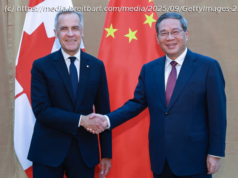Harsh new Chinese sanctions have sparked protests. Is it just savvy optics?
China is getting serious about cracking down on North Korea with punishing economic sanctions — or at least it’s trying to make it look that way.
This week China abruptly cut off seafood imports from North Korea in accordance with new UN Security council sanctions intended to discourage North Korea from advancing its nuclear and ballistic missile programs. And it did so with such speed and intensity that it’s causing an uproar among Chinese seafood traders whose businesses are suffering from the move.
Protests have spread across the Northeastern Chinese city of Hunchun, which hosts hundreds of seafood processing plants and relies almost entirely on food imported from North Korea. Dozens of Chinese seafood importers demonstrated in the streets this week carrying red banners with slogans such as “Money earned from our blood and sweat is sitting on the bridge. Please, customs, let us go” and “Sanction North Korea, as long as you protect Chinese citizens from losses.” (Hopefully they’ re catchier in the original Chinese.)
“It was completely laughable, ” Lang Yulin, an importer from Hunchun, told the Financial Times . “We received the notice of the customs ban only half an hour before everything was totally shut down.”
North Korea relies on China for about 90 percent of its foreign trade. So any move Beijing takes to restrict the flow of North Korean goods into China deals a substantial blow to Pyongyang. But because China’s economy is so intertwined with North Korea’s, it also causes hurt at home.
“I have more than 30 workers and I asked them to all go home or find other jobs, ” Song Min, who runs a fresh seafood business in Hunchun, told the Associated Press.
China clearly wants to look tough on North Korea to outside observers. The very fact that the protests have been so visible and that the Chinese government hasn’ t cracked down on them is likely a deliberate decision to allow the world to witness evidence of its sanctions.
“The fact that they would let [the protests] be amplified in the media is probably part of an information operation inside China, ” explains Patrick Cronin, the senior director of the Asia-Pacific Security Program at the left-leaning Center for a New American Security. “They want to find ways to signal that they’ re doing something.”
But experts say the question is whether China will stay the course.
China has a tricky dilemma when it comes to leaning on North Korea. It would prefer that North Korea not have nuclear weapons and provoke the global community constantly with its missile testing, and for that reason it does want to apply some pressure to Pyongyang.
On the other hand, China isn’ t as worried about North Korea’s nuclear program as it is the potential collapse of the country itself, which would create a refugee crisis on the peninsula and likely send millions of North Koreans pouring across the Chinese-North Korean border. China also believes the US would likely dramatically increase its military presence in the region to deal with the fallout from the collapse and to secure North Korea’s nuclear weapons. And a US military presence on China’s border is not something China’s leaders want to see any time soon.
That dilemma has resulted in an incoherent mix of economic policies toward North Korea. China announced a ban on coal imports from North Korea in February, but overall trade between China and North Korea grew in the first quarter by close to 40 percent. China is also famously lax in its enforcement of the UN-backed luxury goods ban on North Korea; Glaser told me during an interview in April that she’s seen Mercedes-Benz cars drive across the China–North Korean border without license plates.
Right now China has an interest in making dramatic gestures with sanctions enforcement for tactical relief from US pressure. The White House has been demanding that Beijing do more to pinch North Korea’s economy and slow the progress of its nuclear programs, and even hit Chinese banks with sanctions to goad them into doing it.
But while the protests make the Chinese government look like they’ re willing to make hard decisions to put more heat on North Korea, what really matters is if they’ re still doing it in the future.
“The pattern in the past has been initial compliance with sanctions, then becoming more lax over time, ” Bonnie Glaser, the director of the China Power Project at the Center for Strategic and international Studies, told me.
Cronin says that China’s “attention span on sanctions tends to be very short” — typically six months or less.
There is reason to think China could behave differently this time.
President Trump is persistently threatening to impose severe tariffs on China’s exports if it doesn’ t do more to curb North Korea’s nuclear and missile programs. And China is already unnerved by South Korea and Japan’s attempts to improve their missile capabilities. As international pressure ramps up, these developments could be just enough to get China to rethink its usual strategy.






